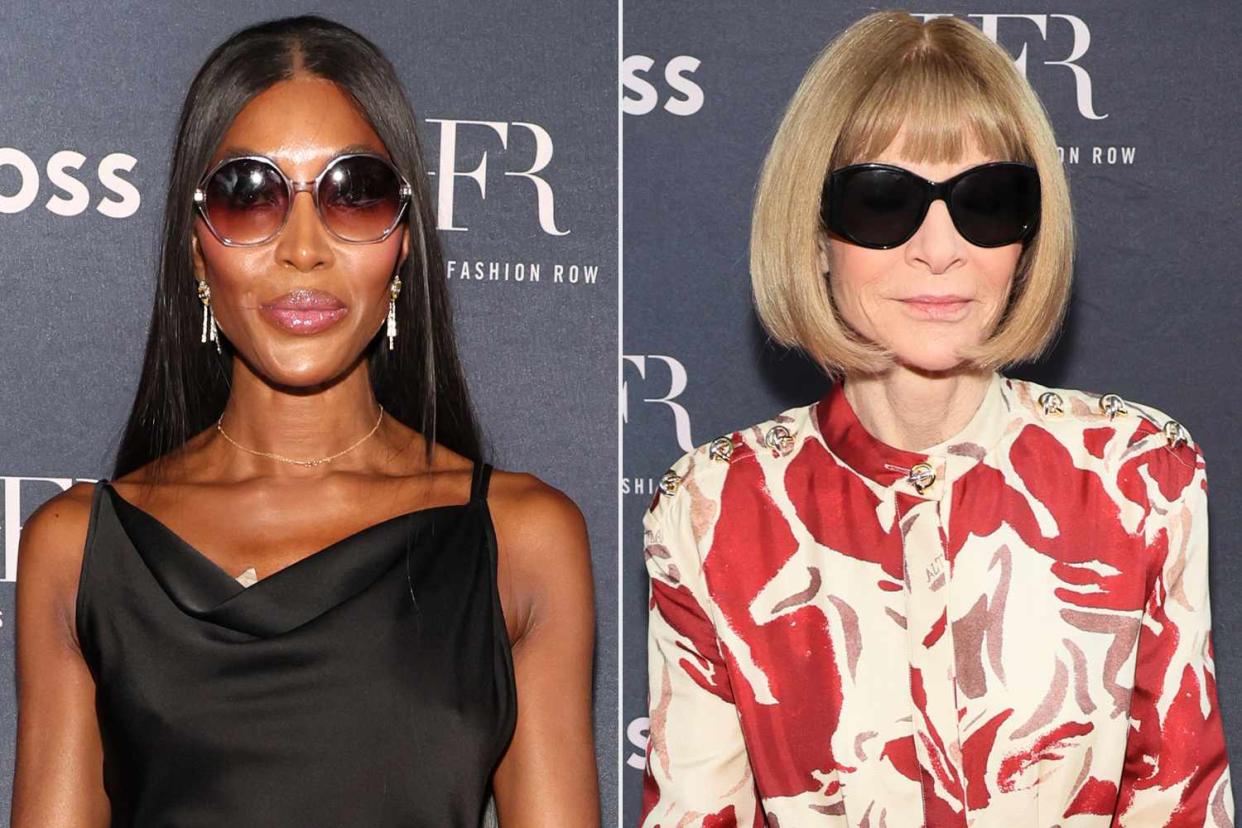Naomi Campbell and Anna Wintour engage in a verbal dispute at Harlem’s Fashion Row.
Naomi Campbell and Anna Wintour engage in a verbal dispute at Harlem’s Fashion Row.

Contrary to the typical trend of commencing awards ceremonies fashionably late, the Harlem’s Fashion Row Show and Style Awards commenced punctually on Tuesday evening at Grant’s Tomb. During her opening speech for the “Night of Legends” event, Brandice Daniel, the founder of Harlem’s Fashion Row, urged the numerous attendees to champion Black designers by dedicating at least 10 percent of their purchases in apparel and home decor to their creations, aiming to instigate a transformation within the industry. She also highlighted that the spending power of Black consumers in the apparel and footwear sectors is projected to reach $70 billion by the year 2030.

Anna Wintour attends the 17th Annual Harlem’s Fashion Row Fashion Show & Style Awards in New York City.
Contrary to the typical trend of commencing awards ceremonies fashionably late, the Harlem’s Fashion Row Show and Style Awards commenced punctually on Tuesday evening at Grant’s Tomb. During her opening speech for the “Night of Legends” event, Brandice Daniel, the founder of Harlem’s Fashion Row, urged the numerous attendees to champion Black designers by dedicating at least 10 percent of their purchases in apparel and home decor to their creations, aiming to instigate a transformation within the industry. She also highlighted that the spending power of Black consumers in the apparel and footwear sectors is projected to reach $70 billion by the year 2030.
According to sources, the timing for Campbell’s award presentation was advanced to an earlier slot on Tuesday, coinciding with her attendance at another press event from which she was unable to depart. A spokesperson for Harlem’s Fashion Row did not provide a response to media inquiries on Wednesday. It was reported that the vehicles of Wintour and Campbell crossed paths as Wintour was departing and Campbell was arriving.
Wintour characterized Campbell as one of the most intrepid individuals she has encountered, noting that the model began to articulate the realities of inequality and injustice early in her career, “at a time when such expressions were not widely accepted.” Wintour emphasized that Campbell’s courage has had a positive impact on the entire fashion industry. As a source of inspiration for designers like Marc Jacobs, Virgil Abloh, and Azzedine Alaïa, Campbell has also emerged as “a fashion godmother to numerous young models and designers,” according to Wintour. She highlighted that Campbell is now a dedicated mother to two children, “which is no small achievement,” and a staunch advocate for global initiatives, particularly in funding research to combat the AIDS crisis and supporting its victims. Nasr was subsequently honored as editor of the year by Tracee Ellis Ross, with whom she formed a friendship in 1994 while interning at Mirabella magazine. Reflecting on her tenure at Harper’s Bazaar—marking a significant milestone as the first Black woman in that role—Nasr articulated that the pivotal questions guiding her purpose were, “‘Who gets to be included in that narrative? Who has the opportunity to contribute to the documentation of our history for future generations to recognize our presence?'”


Campbell told the crowd how she used to go to Harlem, N.Y., as a teenager to listen to the late Rev. Calvin Butts. One of her last trips to the neighborhood was to attend André Leon Talley’s memorial service, where she arranged for a custom white Schiaparelli ensemble and a vintage white Rolls-Royce. “André wouldn’t have wanted it any other way,” she said.
The supermodel thanked Harlem’s Fashion Row founder Daniel and her team’s “commitment to elevating diverse voices in fashion.” Campbell added, “We must still thank Anna Wintour, as she did take the time to come here to give me the award even though I wasn’t here.”
In her thanks, Campbell said that Wintour started supporting her career in 1987, by “taking a chance on a young Black girl from South London” and giving her a shoot for British Vogue. “I thank you for your influence and your continuing support in pushing fashion forward.”
She also praised the “trailblazers who paved the way for a young Black girl like me” including Bethann Hardison, Iman, Naomi Sims, Beverly Johnson, Sonia Cole and Alva Chinn among others. “These are the women that showed me what to do, when I was 17 or 18 and had been hired by Mr. [Yves] Saint Laurent for my first couture show. I had no idea. I was terrified. They showed me how to take off my cape, execute and watch the chandelier so that it didn’t take off my hat, which it did. I am eternally grateful,” Campbell said.
She also spoke of how her mother and grandmother taught her the value of hard work, perseverance and “to never give up,” sharing the award with them and her two daughters. More than anything, the Icon award is a call to action for the industry from Campbell’s viewpoint. Having just agreed to be part of a company that sells African cotton, Campbell said, “Nothing would please me more than to see the brands come back to the motherland, and buy it from where it originally came from.”
All in all, inclusion extends beyond people featured in advertising and on runways, she said. “It’s about who is controlling.

During the acceptance of the Virgil Abloh award from Corey Smith, the vice president of diversity, equity, and inclusion at LVMH, Teyana Taylor passionately articulated how her upbringing in Harlem influenced her aesthetic and ambition. She recounted the formation of a group with her two brothers and a cousin, named Team N.E.R.D. (an acronym for Not Everybody Really Doing It), highlighting their admiration for Pharrell Williams. They engaged in skateboarding and BMX biking, donning the latest sneakers and distinctive eyewear. Taylor noted that regardless of the eyewear, it was evident that they possessed a keen sense for style, trends, and the elusive ‘It’ factor. Taylor emphasized that the primary objective of Team N.E.R.D. was to establish a safe haven for children who shared similar experiences. “Dressing up provided us with a sense of liberation. It was a manifestation of our creativity.”
Related
























